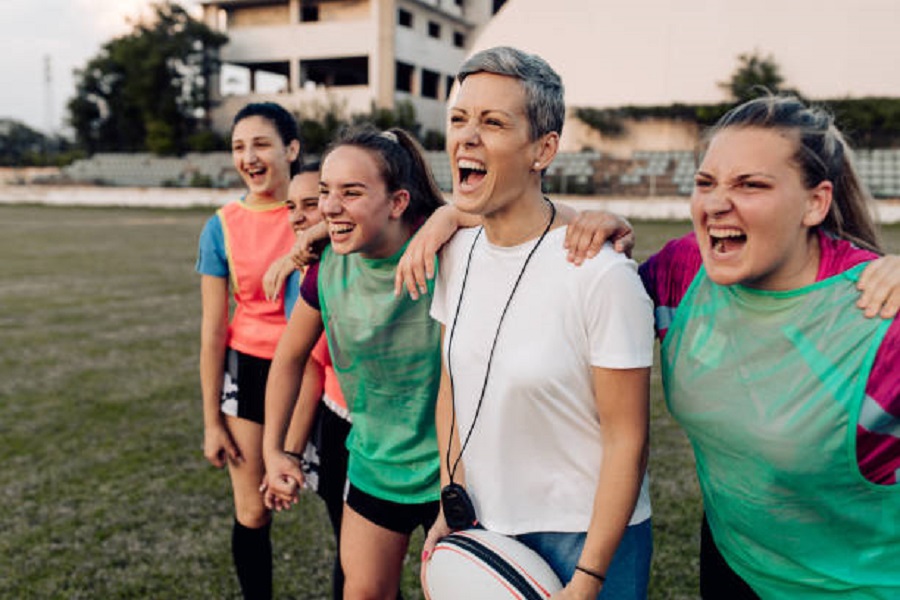
Generation Z, also known as the iGeneration, refers to those born from the mid-1990s to the early 2000s. This group is characterized by its familiarity with technology from an early age, its tendency to value authenticity and social justice, and its significant cultural diversity. The following text will delve into understanding Generation Z athletes and identifying strategies for effective coaching.
This tech-savvy generation has grown up in a digital world. They are natural multi-taskers who can juggle multiple screens and activities at once. This makes them quick learners but also means they may require stimuli to keep them engaged. They are more independent than previous generations due to their technological proficiency.
Unlike their millennial predecessors who sought recognition, Gen Z focuses more on individual achievement. They prefer a personalized training experience where their unique skills and talents are recognized and nurtured.
Strengths of Generation Z Athletes
- Technologically Adept: Their familiarity with technology can be leveraged in training through the use of various sports apps and gadgets.
- Adaptable: Being digital natives makes them quick learners who can easily adapt to new techniques or strategies.
- Goal-Oriented: They have a competitive spirit that drives them towards individual achievement.
- Passionate About Social Issues: Generation Z tends to have strong values and principles about social issues, which can translate into advocacy within their sport.
Communicate Effectively
Effective communication is key in coaching Generation Z athletes. They prefer direct, transparent communication and appreciate when given a voice in decisions that affect them. Coaches can utilize digital channels like social media or team group chats for regular communication. However, it’s also important to balance this with face-to-face interaction.
Understanding and adapting to Generation Z’s unique characteristics can help coaches better connect with their athletes, fostering an environment conducive for growth, development, and success in sports.
Understanding Generation Z
Generation Z, also known as Gen Z, refers to the demographic cohort succeeding Millennials and preceding Generation Alpha. Researchers and popular media typically use the mid-to-late 1990s as starting birth years and the early 2010s as ending birth years.
Gen Z is a generation that has been raised with a digital footprint. They have never known a world without internet, smartphones or social media. This has led to them being more tech-savvy and interconnected than any previous generation.
In terms of athletics and sports, Gen Z athletes have numerous advantages given their exposure to technology. The vast amount of information available at their fingertips allows them to better understand their sport, from techniques to strategies. They are also more likely to be motivated by social causes and community involvement – characteristics which can be harnessed positively in team environments.
- Tech Savvy: Raised in a digitally interconnected world, this generation is extremely comfortable using technology.
- Socially Aware: With access to global news at their fingertips, Gen Z is often very aware of social issues and movements.
- Independent: Many Gen Z individuals value independence highly and tend to prefer learning through self-directed methods.
- Practical: Growing up during economic uncertainty has made many Gen Zers practical and future-oriented.
- Authentic: Generation Z values genuineness highly – they prefer honest brands, institutions, or coaches who are transparent and authentic.
- Competitive: In sports arenas especially; they bring a strong competitive spirit.
Understanding these traits can aid coaches in better understanding the psyche of Gen Z athletes – what motivates them? How do they learn best? What values are important to them? These are all questions that can inform a coach’s approach to training and mentoring athletes of this generation. For example, the use of technology for training, like fitness apps or virtual reality tools, could be very effective with tech-savvy Gen Z athletes. Or perhaps a coach might appeal to their team’s competitive nature by establishing well-defined goals and rewards.
Furthermore, it’s important for coaches to demonstrate authenticity and transparency in their coaching style, as these are highly valued traits by Gen Z individuals. This could mean acknowledging mistakes when they happen, or providing clear and honest feedback during training sessions.
In sports contexts, Generation Z athletes have the potential to revolutionize the field with their tech-savviness, social awareness, and strong competitive spirit. To bring out the best in these athletes, coaches need to understand these characteristics thoroughly and adapt their coaching strategies accordingly.
Challenges of Coaching Generation Z Athletes
Generation Z, those individuals born between 1996 and 2010, are among the most tech-savvy, diverse, and global-minded generation we’ve seen. As young athletes, they bring a unique set of talents to the field or court – but as with any group, there are specific challenges that come with coaching Generation Z. Understanding these challenges can help coaches tailor their approach and strategies to better engage and motivate this unique generation of athletes.
One of the main challenges is their reliance on technology. While convenient in some ways, this reliance may lead to shorter attention spans and a decreased ability to focus on tasks that aren’t immediately engaging or rewarding. A research study by Microsoft Canada found that Generation Z’s average attention span is eight seconds. This is shorter than that of previous generations and can be challenging for coaches who need their players to focus for extended periods during training sessions or games.
Another challenge is their desire for instant gratification. Generation Z has grown up in an era where answers and solutions are often just a click away – from online shopping deliveries within hours to Google providing answers in seconds. This expectation can translate into sports as well where they might expect immediate results or improvements in performance which isn’t always possible.
The third challenge pertains to mental health issues. According to the American Psychological Association, Generation Z reports higher levels of stress and mental health issues than any other generation before them. The pressures they face from academics, peers, social media comparison among others may affect their performance on the field.
Lastly, communication styles have changed with this generation preferring digital communication over face-to-face interaction. Coaches used to traditional ways of communication might find it difficult to connect with these athletes who prefer texts over talks.
- Shorter attention spans due to heavy use of technology
- Expectations for immediate results/gratification
- Increased stress levels & mental health issues
- Preference for digital communications over face-to-face interactions
These challenges are not insurmountable, but they require adapted approaches. For instance, coaches may use technology to their advantage by incorporating tools like video analysis apps into training sessions or leveraging social media for team updates and communication. They can also help their athletes set realistic goals and expectations, promoting patience and resilience.
Strategies for Coaching Generation Z Athletes
When coaching Generation Z athletes, it is essential to adopt strategies that resonate with them. This generation has grown up in a digital age, and they are very technology-savvy. Coaches must therefore use technology to their advantage and incorporate it into their coaching methods.
One approach is utilizing online instructional videos. These can be an invaluable tool as Gen Z athletes are often visual learners who appreciate being able to pause and replay instructions. This allows them to process the information at their own pace.
- Utilize video analysis apps for training sessions
- Use social media platforms like Instagram or Snapchat for team announcements or motivational posts
- Leverage wearable technology for performance tracking
- Emphasize teamwork and community, which are important values to Gen Z
- Foster a culture of respect, inclusiveness, and equality
- Provide constant feedback; Generation Z appreciates knowing where they stand
- Recognize achievements both big and small, this fosters motivation
- Environmentally Friendly Practices:
- Promote recycling in the team environment.
Another crucial aspect of coaching Generation Z athletes is being aware that they have grown up amid significant societal changes regarding mental health awareness. Consequently, coaches need to prioritize creating an environment where players feel comfortable discussing any issues they may be facing.
In addition to these strategies, coaches need to remember that every athlete is unique and will respond differently to various coaching styles. It’s important to be flexible in your approach and willing to adapt based on what works best for each individual athlete.
Ultimately, successful coaching of Generation Z athletes involves understanding their world view and meeting them where they are. This generation is full of potential, and with the right strategies, coaches can help them unlock it.
Communicate Effectively
Communication is the lifeblood of any coaching relationship and it’s no different when coaching Generation Z athletes. However, due to their unique characteristics, communicating with Gen Z requires a slightly different approach. As digital natives, they have grown up in a world that is vastly different from the previous generations. Thus, effective communication with them requires understanding their mindset and adjusting your strategies accordingly.
First and foremost, Gen Z athletes are used to immediate feedback. They won’t wait until the next training session to go over their performance – they expect instant critique and direction. Given this expectation, coaches should be prepared to provide real-time feedback during practices and games whenever possible. This doesn’t mean constant micromanagement, but rather providing constructive comments that help them improve.
- Leverage Technology: Gen Zers are comfortable using technology for communication – in fact, they prefer it. Whether it’s through social media platforms or team communication apps like Slack or TeamSnap, getting your message across digitally could yield better results than traditional methods.
- Be Straightforward: Gen Z values authenticity and straightforwardness. They appreciate coaches who tell it like it is – so don’t beat around the bush.
- Utilize Visual Aids: This generation has been raised on platforms like YouTube and Instagram, so they’re used to digesting information visually. Use video clips or images to illustrate play strategies or demonstrate proper technique.
- Say Less: Keep your instructions clear and concise. With a notoriously short attention span – shorter even than millennials – Gen Z athletes respond best to brief instructions delivered directly.
- Promote Open Dialogue: Encourage them to voice out their thoughts and opinions during team meetings or one-on-one sessions. This can foster a more collaborative atmosphere within the team.
Remember, the aim is not to change the way Generation Z athletes interact with the world. Instead, it’s about adapting your coaching style to align with their communication preferences. By doing so, you can build a stronger connection with them and ultimately help them reach their full potential as athletes. This effective communication will form the foundation of a successful coach-athlete relationship, facilitating better understanding and collaboration between both parties on and off the field.
In essence, efficient and effective communication plays a critical role in successful coaching – especially when dealing with Generation Z athletes. By understanding their preferences and adjusting your strategies accordingly, you can foster better relationships and drive optimal performance.




